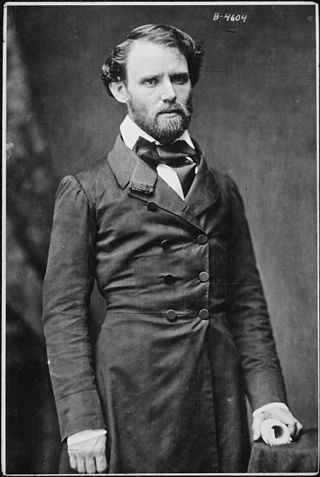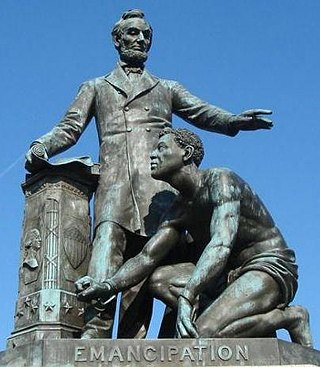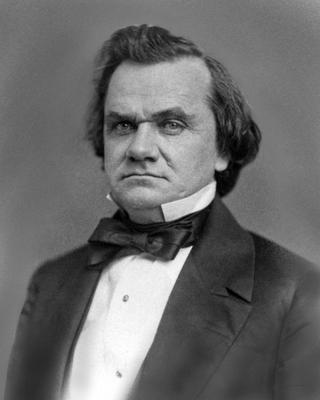
The Kansas–Nebraska Act of 1854 was a territorial organic act that created the territories of Kansas and Nebraska. It was drafted by Democratic Senator Stephen A. Douglas, passed by the 33rd United States Congress, and signed into law by President Franklin Pierce. Douglas introduced the bill intending to open up new lands to develop and facilitate the construction of a transcontinental railroad. However, the Kansas–Nebraska Act effectively repealed the Missouri Compromise of 1820, stoking national tensions over slavery and contributing to a series of armed conflicts known as "Bleeding Kansas."
Dred Scott v. Sandford, 60 U.S. 393 (1857), was a landmark decision of the United States Supreme Court that held the U.S. Constitution did not extend American citizenship to people of black African descent, and therefore they could not enjoy the rights and privileges the Constitution conferred upon American citizens. The decision is widely considered the worst in the Supreme Court's history, being widely denounced for its overt racism, judicial activism, poor legal reasoning, and crucial role in the start of the American Civil War four years later. Legal scholar Bernard Schwartz said that it "stands first in any list of the worst Supreme Court decisions". A future chief justice, Charles Evans Hughes, called it the Court's "greatest self-inflicted wound".

The origins of the American Civil War were rooted in the desire of the Southern states to preserve the institution of slavery. Historians in the 21st century overwhelmingly agree on the centrality of slavery in the conflict. They disagree on which aspects were most important, and on the North's reasons for refusing to allow the Southern states to secede. The pseudo-historical Lost Cause ideology denies that slavery was the principal cause of the secession, a view disproven by historical evidence, notably some of the seceding states' own secession documents. After leaving the Union, Mississippi issued a declaration stating, "Our position is thoroughly identified with the institution of slavery—the greatest material interest of the world."
Popular sovereignty is the principle that the leaders of a state and its government are created and sustained by the consent of its people, who are the source of all political legitimacy. Popular sovereignty, being a principle, does not imply any particular political implementation. Benjamin Franklin expressed the concept when he wrote that "In free governments, the rulers are the servants and the people their superiors and sovereigns".

The Lincoln–Douglas debates were a series of seven debates in 1858 between Abraham Lincoln, the Republican Party candidate for the United States Senate from Illinois, and incumbent Senator Stephen Douglas, the Democratic Party candidate. Until the Seventeenth Amendment to the United States Constitution, which provides that senators shall be elected by the people of their states, was ratified in 1913, senators were elected by their respective state legislatures, so Lincoln and Douglas were trying to win the votes of the state legislature of the two chambers of the Illinois General Assembly meeting at the state capital town of Springfield for their respective political parties.

George Ellis Pugh was a Democratic politician from Ohio. He served in the U.S. Senate from 1855 to 1861.

The history of the United States from 1849 to 1865 was dominated by the tensions that led to the American Civil War between North and South, and the bloody fighting in 1861–1865 that produced Northern victory in the war and ended slavery. At the same time industrialization and the transportation revolution changed the economics of the Northern United States and the Western United States. Heavy immigration from Western Europe shifted the center of population further to the North.

John Archibald Campbell was an American jurist. He was a successful lawyer in Georgia and Alabama, where he served in the state legislature. Appointed by Franklin Pierce to the United States Supreme Court in 1853, he resigned at the beginning of the American Civil War, traveled south and became an official of the Confederate States of America. After serving six months in a military prison at war's end, he secured a pardon and resumed his law practice in New Orleans, where he also opposed Reconstruction.

The 1860 Democratic National Conventions were a series of presidential nominating conventions held to nominate the Democratic Party's candidates for president and vice president in the 1860 election.

Abraham Lincoln's position on slavery in the United States is one of the most discussed aspects of his life. Lincoln frequently expressed his moral opposition to slavery in public and private. "I am naturally anti-slavery. If slavery is not wrong, nothing is wrong," he stated. "I can not remember when I did not so think, and feel." However, the question of what to do about it and how to end it, given that it was so firmly embedded in the nation's constitutional framework and in the economy of much of the country, even though concentrated in only the Southern United States, was complex and politically challenging. In addition, there was the unanswered question, which Lincoln had to deal with, of what would become of the four million slaves if liberated: how they would earn a living in a society that had almost always rejected them or looked down on their very presence.

Lyman Trumbull was an American lawyer, judge, and politician who represented the state of Illinois in the United States Senate from 1855 to 1873. Trumbull was a leading abolitionist attorney and key political ally to Abraham Lincoln and authored several landmark pieces of reform as chair of the Judiciary Committee during the American Civil War and Reconstruction era, including the Confiscation Acts, which created the legal basis for the Emancipation Proclamation; the Thirteenth Amendment to the United States Constitution, which abolished chattel slavery; and the Civil Rights Act of 1866, which led to the Fourteenth Amendment to the United States Constitution.

The House Divided Speech was an address given by senatorial candidate and future president of the United States Abraham Lincoln, on June 16, 1858, at what was then the Illinois State Capitol in Springfield, after he had accepted the Illinois Republican Party's nomination as that state's US senator. The nomination of Lincoln was the final item of business at the convention, which then broke for dinner, meeting again at 8 pm. "The evening session was mainly devoted to speeches", but the only speaker was Lincoln, whose address closed the convention, save for resolutions of thanks to the city of Springfield and others. His address was immediately published in full by newspapers, as a pamphlet, and in the published proceedings of the convention. It was the launching point of his unsuccessful campaign for the senatorial seat held by Stephen A. Douglas; the campaign would climax with the Lincoln–Douglas debates. When Lincoln collected and published his debates with Douglas as part of his 1860 presidential campaign, he prefixed them with relevant prior speeches. The "House Divided" speech opens the volume.

The history of slavery in Missouri began in 1720, predating statehood, with the large-scale slavery in the region, when French merchant Philippe François Renault brought about 500 slaves of African descent from Saint-Domingue up the Mississippi River to work in lead mines in what is now southeastern Missouri and southern Illinois. These were the first enslaved Africans brought in masses to the middle Mississippi River Valley. Prior to Renault's enterprise, slavery in Missouri under French colonial rule had a much smaller scale compared to elsewhere in the French colonies. Immediately prior to the American Civil War, there were about 100,000 enslaved people in Missouri, about half of whom lived in the 18 western counties near the Kansas border.

The presidency of James Buchanan began on March 4, 1857, when James Buchanan was inaugurated as 15th president of the United States, and ended on March 4, 1861. Buchanan, a Democrat from Pennsylvania, took office as the 15th United States president after defeating John C. Frémont of the Republican Party and former President Millard Fillmore of the American Party in the 1856 presidential election. He declined to seek re-election and was succeeded by Republican Abraham Lincoln.
Popular sovereignty is the principle that the leaders of a state and its government are created and sustained by the consent of its people, who are the source of all political legitimacy. Citizens may unite and offer to delegate a portion of their sovereign powers and duties to those who wish to serve as officers of the state, contingent on the officers agreeing to serve according to the will of the people. In the United States, the term has been used to express this concept in constitutional law. It was also used during the 19th century in reference to a proposed solution to the debate over the expansion of slavery in the United States. The proposal would have given the power to determine the legality of slavery to the inhabitants of the territory seeking statehood, rather than to Congress.

Archibald Williams was a United States district judge of the United States District Court for the District of Kansas. Williams was a friend and political ally of President Abraham Lincoln.

Stephen Arnold Douglas was an American politician and lawyer from Illinois. A U.S. Senator, he was one of two nominees of the badly split Democratic Party to run for president in the 1860 presidential election, which was won by Republican candidate Abraham Lincoln. Douglas had previously defeated Lincoln in the 1858 United States Senate election in Illinois, known for the pivotal Lincoln–Douglas debates. He was one of the brokers of the Compromise of 1850, which sought to avert a sectional crisis; to further deal with the volatile issue of extending slavery into the territories, Douglas became the foremost advocate of popular sovereignty, which held that each territory should be allowed to determine whether to permit slavery within its borders. This attempt to address the issue was rejected by both pro-slavery and anti-slavery advocates. Douglas was nicknamed the "Little Giant" because he was short in physical stature but a forceful and dominant figure in politics.

Lemmon v. New York, or Lemmon v. The People (1860), popularly known as the Lemmon Slave Case, was a freedom suit initiated in 1852 by a petition for a writ of habeas corpus. The petition was granted by the Superior Court in New York City, a decision upheld by the New York Court of Appeals, New York's highest court, in 1860 on the eve of the Civil War.

Commonwealth v. Aves, 35 Mass. 193 (1836), was a case in the Massachusetts Supreme Judicial Court on the subject of transportation of slaves to free states. In August 1836, Chief Justice Lemuel Shaw ruled that slaves brought to Massachusetts "for any temporary purpose of business or pleasure" were entitled to freedom. The case was the most important legal victory for abolitionists in the 1830s and set a major precedent throughout the North.
This article documents the political career of Abraham Lincoln from the end of his term in the United States House of Representatives in March 1849 to the beginning of his first term as President of the United States in March 1861.















